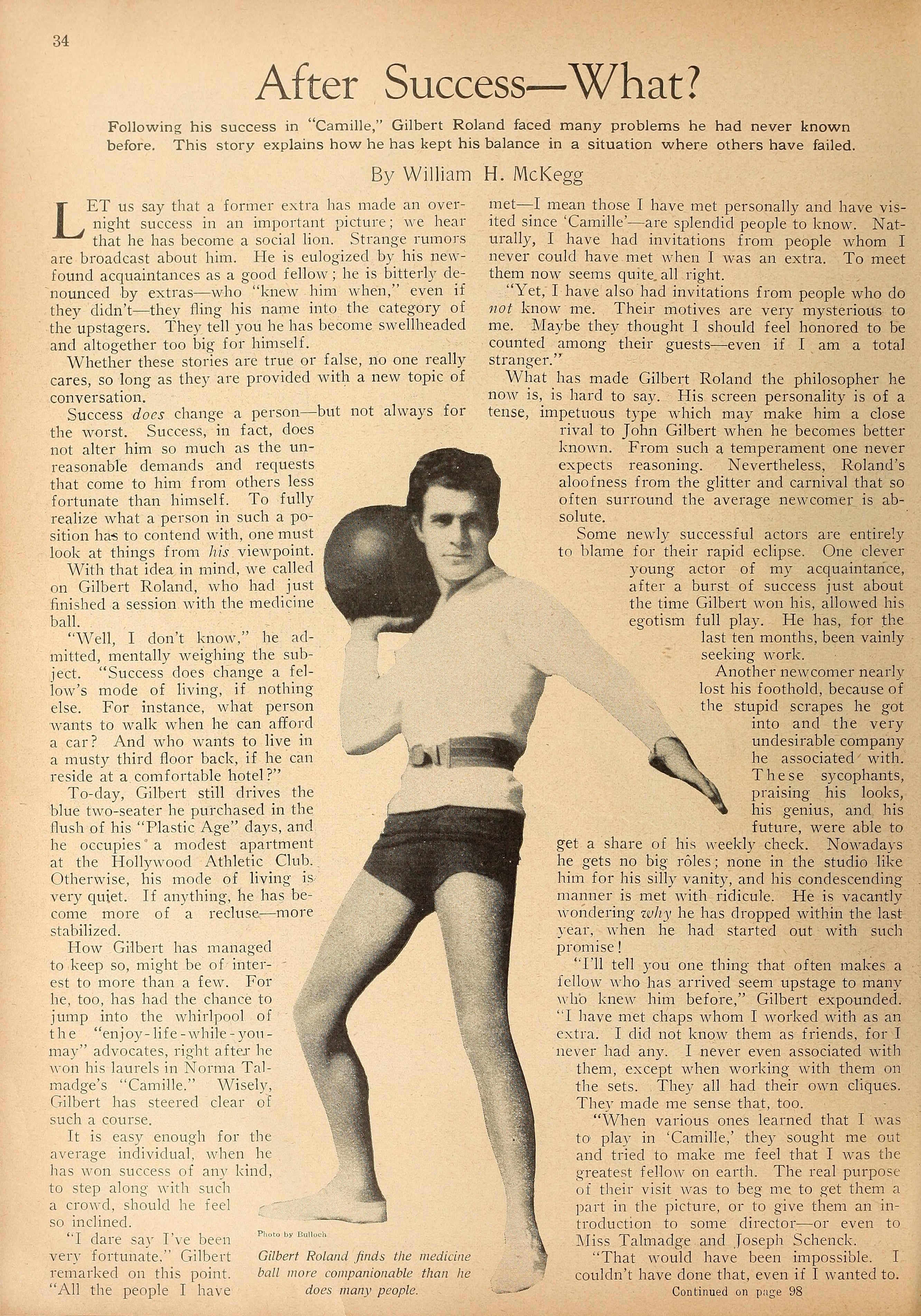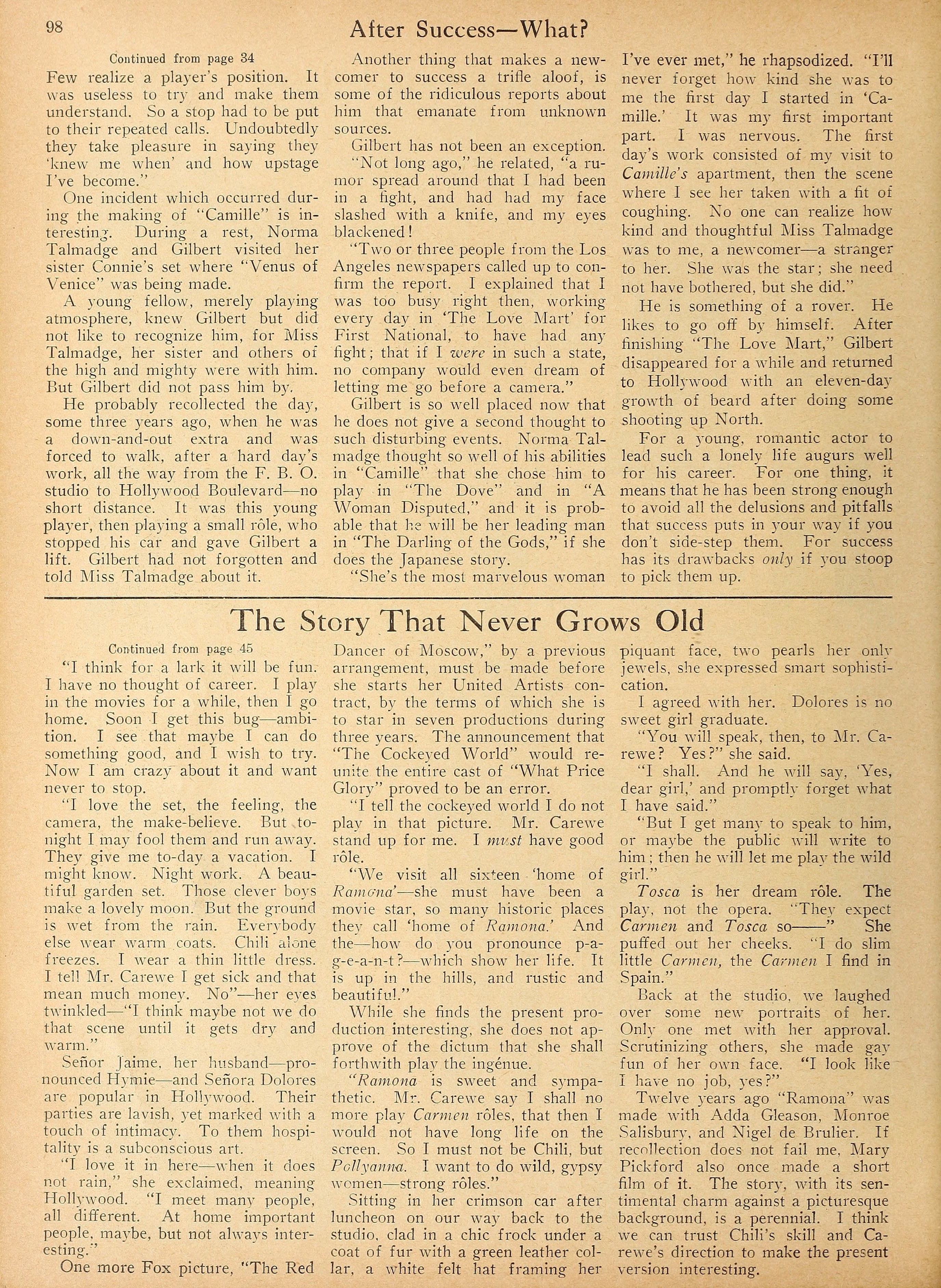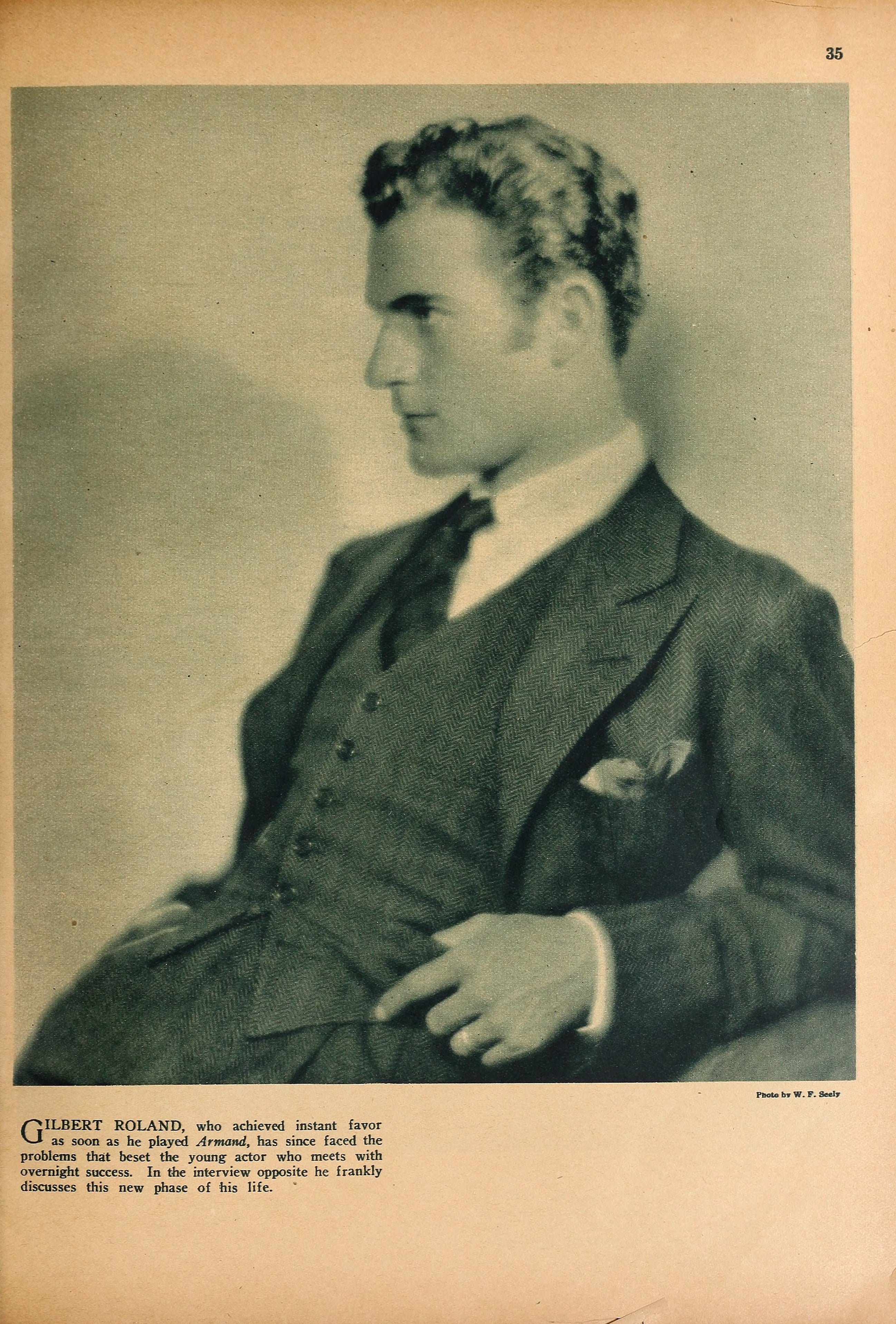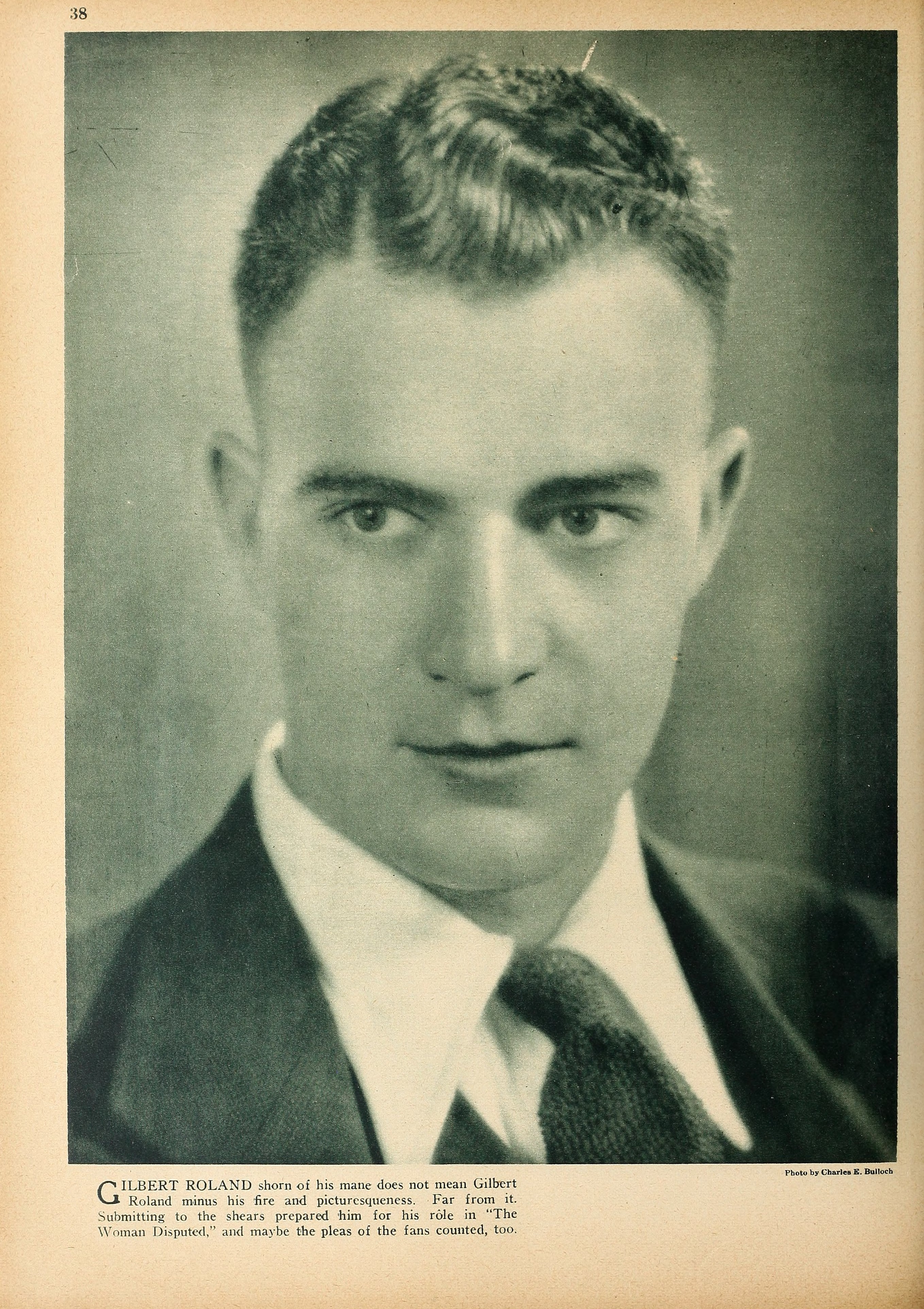Gilbert Roland — After Success — What? (1928) 🇺🇸

Let us say that a former extra has made an overnight success in an important picture; we hear that he has become a social lion. Strange rumors are broadcast about him. He is eulogized by his newfound acquaintances as a good fellow; he is bitterly denounced by extras — who “knew him when,” even if they didn’t — they fling his name into the category of the upstagers. They tell you he has become swellheaded and altogether too big for himself.
by William H. McKegg
Whether these stories are true or false, no one really cares, so long as they are provided with a new topic of conversation.
Success does change a person — but not always for the worst! Success, in fact, does not alter him so much as the unreasonable demands and requests that come to him from others less fortunate than himself. To fully realize what a person in such a position has to contend with, one must look at things from his viewpoint.
With that idea in mind, we called on Gilbert Roland, who had just finished a session with the medicine ball:
“Well, I don’t know,” he admitted, mentally weighing the subject. “Success does change a fellow’s mode of living, if nothing else. For instance, what person wants to walk when he can afford a car? And who wants to live in a musty third floor back, if he can reside at a comfortable hotel?”
To-day, Gilbert still drives the blue two-seater he purchased in the flush of his Plastic Age days, and he occupies a modest apartment at the Hollywood Athletic Club. Otherwise, his mode of living is very quiet. If anything, he has become more of a recluse — more stabilized.
How Gilbert has managed to keep so, might be of interest to more than a few. For he, too, has had the chance to jump into the whirlpool of the “enjoy-life-while-you may” advocates, right after he won his laurels in Norma Talmadge’s Camille. Wisely, Gilbert has steered clear of such a course.
It is easy enough for the average individual, when he has won success of any kind, to step along with such a crowd, should he feel so inclined.
“I dare say I’ve been very fortunate.” Gilbert remarked on this point. “All the people I have met— I mean those I have met personally and have visited since Camille — are splendid people to know. Naturally, I have had invitations from people whom I never could have met when I was an extra. To meet them now seems quite, all right.
“Yet, I have also had invitations from people who do not know me. Their motives are very mysterious to me. Maybe they thought I should feel honored to be counted among their guests — even if I am a total stranger.”
What has made Gilbert Roland the philosopher he now is, is hard to say. His screen personality is of a tense, impetuous type which may make him a close rival to John Gilbert when he becomes better known. From such a temperament one never expects reasoning. Nevertheless, Roland’s aloofness from the glitter and carnival that so often surround the average newcomer is absolute.
Some newly successful actors are entirely to blame for their rapid eclipse. One clever young actor of my acquaintance, after a burst of success just about the time Gilbert won his, allowed his egotism full play. He has, for the last ten months, been vainly seeking work.
Another newcomer nearly lost his foothold, because of the stupid scrapes he got into and the very undesirable company he associated with. These sycophants, praising his looks, his genius, and, his future, were able to get a share of his weekly check. Nowadays he gets no big roles; none in the studio like him for his silly vanity, and his condescending manner is met with ridicule. He is vacantly wondering why he has dropped within the last year, when he had started out with such promise!
“I’ll tell you one thing that often makes a fellow who has arrived seem upstage to many who knew him before,” Gilbert expounded. “I have met chaps whom I worked with as an extra. I did not know them as friends, for I never had any. I never even associated with them, except when working with them on the sets. They all had their own cliques. They made me sense that, too.
“When various ones learned that I was to play in Camille, they sought me out and tried to make me feel that I was the greatest fellow on earth. The real purpose of their visit was to beg me to get them a part in the picture, or to give them an introduction to some director — or even to Miss Talmadge and Joseph Schenck [Joseph M. Schenck].
“That would have been impossible. I couldn’t have done that, even if I wanted to.
Few realize a player’s position. It was useless to try and make them understand. So a stop had to be put to their repeated calls. Undoubtedly they take pleasure in saying they ‘knew me when’ and how upstage I’ve become.”
One incident which occurred during the making of “Camille” is interesting. During a rest, Norma Talmadge and Gilbert visited her sister Connie’s (Constance Talmadge) set where “Venus of Venice” was being made.
A young fellow, merely playing atmosphere, knew Gilbert but did not like to recognize him, for Miss Talmadge, her sister and others of the high and mighty were with him. But Gilbert did not pass him by.
He probably recollected the day, some three years ago, when he was a down-and-out extra and was forced to walk, after a hard day’s work, all the way from the F. B. O. studio to Hollywood Boulevard — no short distance. It was this young player, then playing a small role, who stopped his car and gave Gilbert a lift. Gilbert had not forgotten and told Miss Talmadge about it.
Another thing that makes a newcomer to success a trifle aloof, is some of the ridiculous reports about him that emanate from unknown sources.
Gilbert has not been an exception.
“Not long ago,” he related, “a rumor spread around that I had been in a fight, and had had my face slashed with a knife, and my eyes blackened!
“Two or three people from the Los Angeles newspapers called up to confirm the report. I explained that I was too busy right then, working every day in The Love Mart for First National, to have had any fight; that if I we’re in such a state, no company would even dream of letting me go before a camera.”
Gilbert is so well placed now that he does not give a second thought to such disturbing events. Norma Talmadge thought so well of his abilities in Camille that she chose him to play in The Dove and in The Woman Disputed, and it is probable that he will be her leading man in “The Darling of the Gods,” if she does the Japanese story.
“She’s the most marvelous woman I’ve ever met,” he rhapsodized. “I’ll never forget how kind she was to me the first day I started in Camille. It was my first important part. I was nervous. The first day’s work consisted of my visit to Camille’s apartment, then the scene where I see her taken with a fit of coughing. No one can realize how kind and thoughtful Miss Talmadge was to me, a newcomer — a stranger to her. She was the star; she need not have bothered, but she did.”
He is something of a rover. He likes to go off by himself. After finishing The Love Mart, Gilbert disappeared for a while and returned to Hollywood with an eleven-day growth of beard after doing some shooting up North.
For a young, romantic actor to lead such a lonely life augurs well for his career. For one thing, it means that he has been strong enough to avoid all the delusions and pitfalls that success puts in your way if you don’t side-step them. For success has its drawbacks only if you stoop to pick them up.

Gilbert Roland finds the medicine ball more companionable than he does many people.
Photo by Charles E. Bulloch


Gilbert Roland, who achieved instant favor as soon as he played Armand, has since faced the problems that beset the young actor who meets with overnight success. In the interview opposite he frankly discusses this new phase of his life.
Photo by: Walter Fredrick Seely (1886–1959)
Collection: Picture Play Magazine, March 1928
—

Gilbert Roland shorn of his mane does not mean Gilbert Roland minus his fire and picturesqueness. Far from it. Submitting to the shears prepared him for his role in The Woman Disputed, and maybe the pleas of the fans counted, too.
Photo by Charles E. Bulloch
Collection: Picture Play Magazine, July 1928
